There are many basic Italian phrases you need to know when learning Italian, mainly because you won’t always find Italians who speak and understand English, but also because it’s well appreciated when visitors make an effort to interact with locals in their native language! After all, you want to make sure you’re able to order a meal at a restaurant, ask for directions and greet people properly according to the situation.
At the same time, it is essential to learn how to say sorry or apologize in Italian. Mistakes happen, but, no matter how big or small they are, a good apology, when needed, can make a tense situation less dramatic and keep the atmosphere light and friendly.
You’ve probably been told that to apologize in Italian you say “scusa”. However, this is not always the case! It’s one thing to apologize for accidentally stepping on a stranger’s foot, and another to express your sympathy or regret for something more serious.
While English has the all-purpose word “sorry” and many other variations, the Italian language has an even larger variety of words and phrases to say sorry, whose use depends on the context, the level of formality and the relationship to the people you’re apologizing to.
While according to Elton John “sorry seems to be the hardest word”. I’ll show you that it doesn’t necessarily have to be, at least not in Italian! After reading this guide, apologizing will be facile (easy).
Iniziamo! (Let’s get started!)
Watch the full video lesson on my YouTube Channel
How to say sorry in Italian using “scusare”
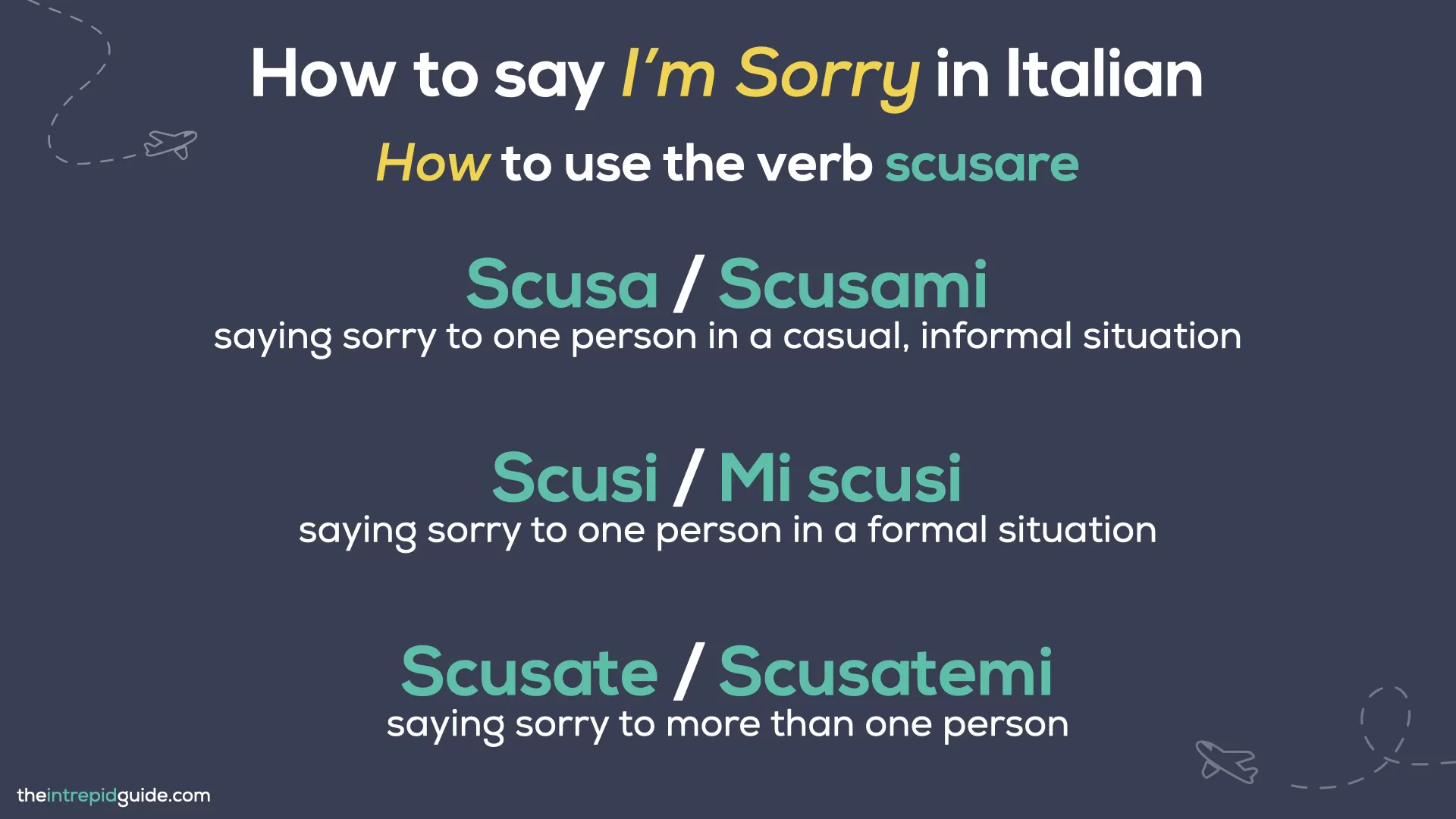 How do you say sorry in Italian? The most common word to say sorry in Italian is “scusa”, from the verb “scusare” (to excuse). You’ll hear it constantly in everyday life.
How do you say sorry in Italian? The most common word to say sorry in Italian is “scusa”, from the verb “scusare” (to excuse). You’ll hear it constantly in everyday life.
However, keep in mind that many phrases used to apologize in Italian distinguish between informal and formal situations. “Scusa”, for example, can be used with a friend or someone you know well, but it’s not really appropriate for use in more formal contexts.
The first thing to know before learning how to say sorry in Italian in formal contexts is that, in these situations, you always need to switch to the “Lei” form, that is, the forma di cortesia (courtesy form) that we use when addressing the elderly, doctors, professors, people we are not acquainted with, staff working in pharmacies, shops, restaurants and so on. Basically anyone you don’t know well or with a high social ranking.
Here is how you use the verb “scusare” according to the number of people you’re talking to and the context:
- Scusa or scusami (saying sorry to one person in a casual, informal situation)
- Scusi or mi scusi (saying sorry to one person in a formal situation)
- Scusate or scusatemi (saying sorry to more than one person)
When do you say each of them? There are two main cases when the forms of “scusare” are suitable: when you did something wrong or bad, accidentally or not, and when you want to get someone’s attention before asking something. The former corresponds to the English “sorry” while the latter is the equivalent of “excuse me”.
Use connectors like ma (but), per (for), che (that), se (if) to create full sentences to say sorry in Italian. Here are some example scenarios of phrases with “scusare” put into action:
- Scusa se ti disturbo. – (Sorry if I bother you.)
- Mi scusi, come ha detto che si chiama? (Sorry, what was your name again?)
- Scusate se sono stato un po’ assente ultimamente. (Sorry if I was a bit absent lately.)
- Scusa ma non posso uscire con te stasera. (Sorry but I can’t go out with you tonight.)
- Scusa per ieri. (Sorry about yesterday.)
- Mi scusi, è libero questo posto? (Excuse me, is this seat free?)
- Scusa, sai che ore sono? (Excuse me, do you know what time it is?)
Another word you can use to get someone’s attention is with ‘Prego!’.
An alternative but less common phrase for saying sorry in Italian is “mi scuso”, from the reflexive verb “scusarsi” (lit. “to excuse oneself”, to apologize). This is mostly found in formal and written discourse, for instance when writing a formal email. For example:
- Mi scuso per la risposta tardiva. (I apologize for the delayed reply.)
How to say sorry in Italian using “dispiacere”
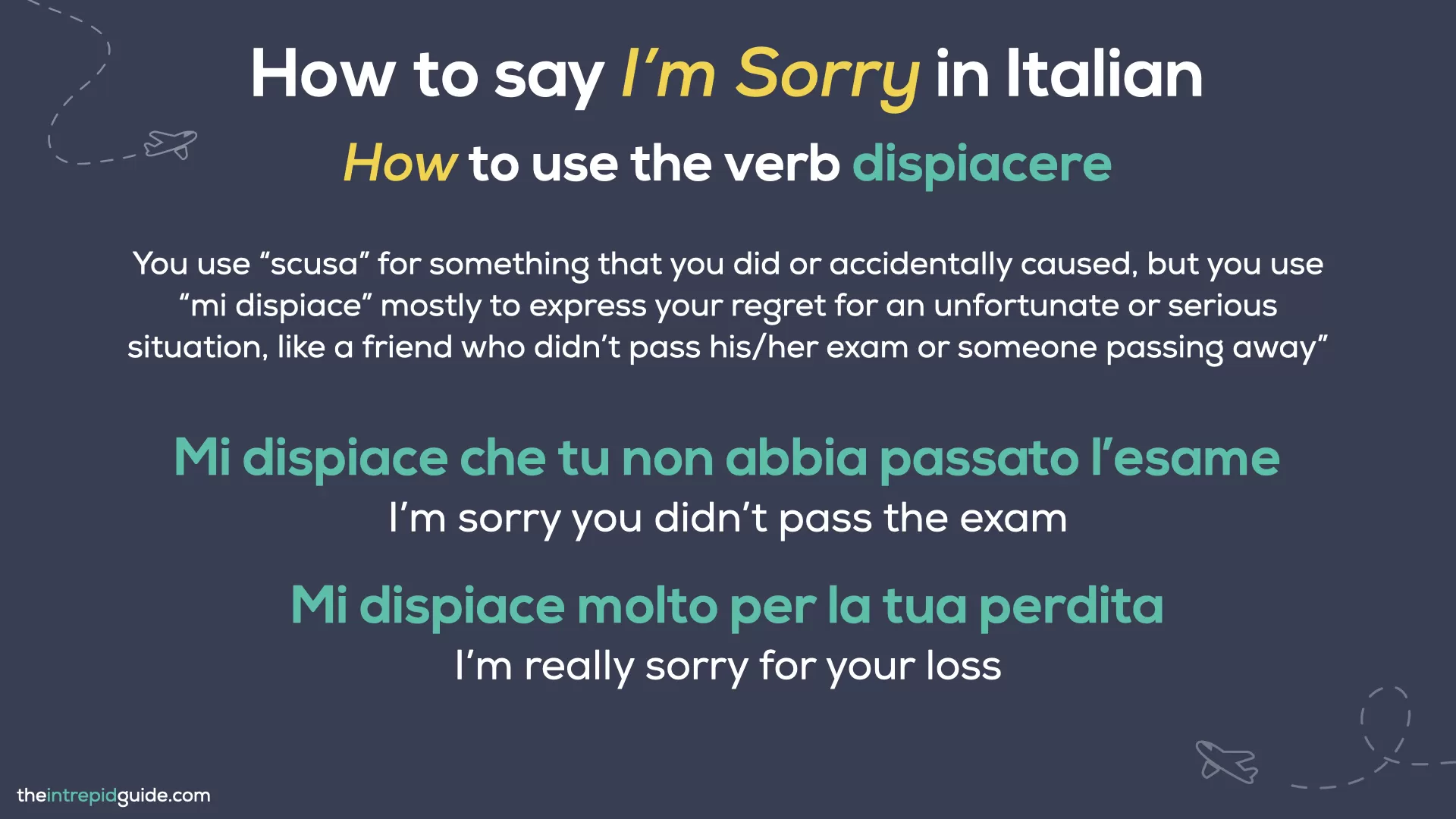 Another very common phrase is “Mi dispiace”, which comes from the verb “dispiacere”, meaning “to be sorry” or “to regret”. Unlike the apology expressions deriving from “scusare” that we saw above, “mi dispiace” doesn’t contain a reference to the person we’re talking to. We can say that “mi dispiace” is the most versatile of all because you don’t have to think of the degree of formality required by the situation or the number of people you want to apologize to.
Another very common phrase is “Mi dispiace”, which comes from the verb “dispiacere”, meaning “to be sorry” or “to regret”. Unlike the apology expressions deriving from “scusare” that we saw above, “mi dispiace” doesn’t contain a reference to the person we’re talking to. We can say that “mi dispiace” is the most versatile of all because you don’t have to think of the degree of formality required by the situation or the number of people you want to apologize to.
As for its meaning, however, you should know that “mi dispiace” is different from “scusa”. You say “scusa” for something that you did or accidentally caused, but you use “mi dispiace” mostly to express your regret for an unfortunate or serious situation, like a friend who didn’t pass his/her exam or someone passing away; for example:
- Mi dispiace che tu non abbia passato l’esame. (I’m sorry you didn’t pass the exam.)
- Mi dispiace molto per la tua perdita. (I’m really sorry for your loss)
Attenzione! (Be careful!) Notice that in this case, “mi dispiace” and “scusa” are NOT interchangeable!
“Mi dispiace” also means “to feel sorry for someone”, for example:
- Mario ha avuto un anno difficile, mi dispiace per lui. (Mario has had a rough year, I feel sorry for him.)
We can also use it when making an apology. Just like with “scusa” and its variations, “mi dispiace” is normally accompanied by an additional sentence explaining what you are apologizing for, for example:
- Mi dispiace ma non posso venire con te alla festa stasera. (I’m sorry but I can’t come to the party with you tonight.)
- Mi dispiace di non averti richiamato ieri. (I’m sorry that I didn’t call you back yesterday.)
An alternative is “mi spiace”. This phrase carries the same meaning as “mi dispiace” but in a slightly more informal sense.
- Ho finito il caffè, mi spiace! (I ran out of coffee, sorry!)
If you add the negation “non” in front of “mi dispiace”, you obtain another expression which has nothing to do with apologizing. Saying “non mi dispiace” is just like saying “I don’t mind” in English. Take a look at the following phrase:
- Ti piace il posto? – Non mi dispiace! (Do you like the place? – I don’t mind it!)
“Mi dispiace” can sound a bit over the top in situations such as accidentally bumping into someone on the bus, quickly apologizing for being late, or having to ask someone to repeat what they’ve said because you didn’t understand; it just feels like you’re overemphasizing the apology. Here, saying “scusa(mi)”, “scusate(mi)” or “(mi) scusi” will sound more natural. Here are some examples:
- Mi scusi, non l’avevo vista. (Sorry, I didn’t see you)
- Scusate il ritardo. (Sorry I’m late)
- Scusa, puoi ripetere? Non ho capito. Sorry, can you say that again? I didn’t get that.
How to say sorry in Italian using “perdonare”
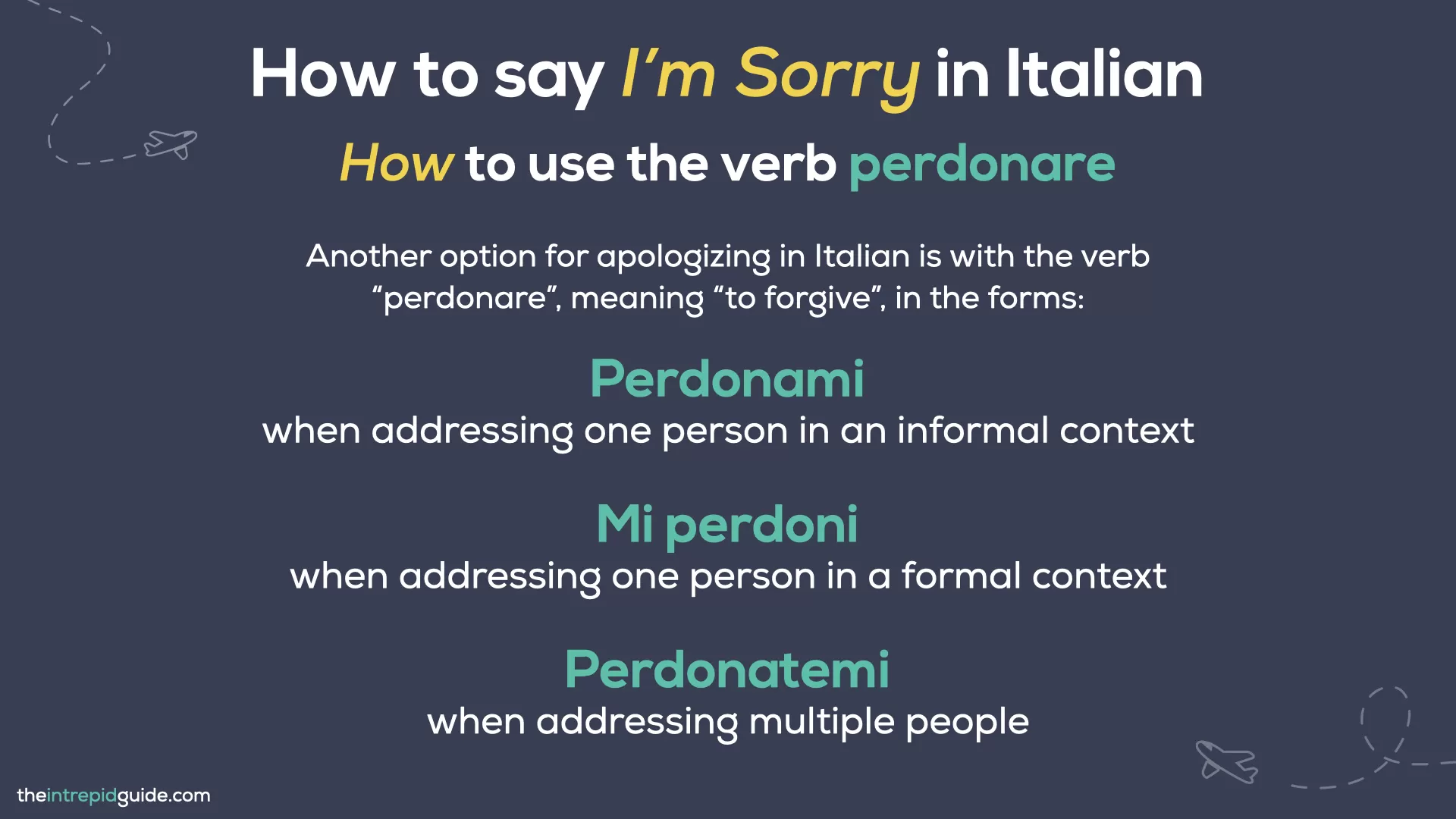 Another option for apologizing in Italian is with the verb “perdonare”, meaning “to forgive”, in the forms:
Another option for apologizing in Italian is with the verb “perdonare”, meaning “to forgive”, in the forms:
- Perdonami (when addressing one person in an informal context)
- Mi perdoni (when addressing one person in a formal context)
- Perdonatemi (when addressing multiple people)
These are more or less the equivalent of the English “pardon / forgive me”. They’re less frequent and slightly more serious in tone than “scusami”, “mi scusi” and “scusatemi”.
Again, use these phrases with connectors to make full sentences. Here are some examples:
- Perdonami ma ho avuto un contrattempo. (Pardon me, but I’ve had a hitch.)
- Mi perdoni se la contatto solo ora. (Forgive me for contacting you only now.)
- Perdonatemi per avervi offeso. (Forgive me for offending you all).
- Perdonami, ho esagerato. (Pardon me, I exaggerated.)
Other useful phrases to apologize in Italian
Here are other useful expressions you might want to use to express your sincere apologies in Italian. Some of them are quite advanced and you might find it difficult to use them at first, but remember that practice is the key and the more you practice trying out alternative expressions, the more natural you will become in using them. Italians will definitely appreciate the effort!
Note: the letters in brackets show the variation according to gender, number and degree for formality; for example:
- (sing.) = singular, you’re addressing one person in an informal context;
- (form.) = the context is formal;
- (pl.) = you’re addressing multiple persons;
- (masc.) = who’s speaking is male; (fem.) = who’s speaking is female.
Making promises
Promising something won’t happen again or committing yourself to do better next time will restore hope and trust in the people you’ve hurt (accidentally or not). To do so, use these phrases:
- Ti prometto che non si ripeterà (I promise you it won’t happen again)
- Farò in modo che non succederà più (I’ll make sure it won’t happen again)
Apologies in form of questions
A very good way to say sorry is by asking for forgiveness or offering to do something to remedy your mistake:
- Come posso rimediare la situazione? (How can I fix the situation?)
- Mi puoi (sing.) / può (form.) / potete (pl.) perdonare? (Can you forgive me?)
Acknowledging your mistake
Knowing and admitting your mistakes is a great sign of maturity and politeness. Here are some phrases you can use in Italian to show someone that you acknowledge your mistake and/or the gravity of what you did.
- So di aver sbagliato (I know I’ve made a mistake)
- So di aver esagerato (I know I have exaggerated)
- Riconosco il mio sbaglio (I recognize my mistake)
- Riconosco di aver agito / reagito male (I recognize that I have acted/reacted badly)
- Mi assumo tutte le responsabilità (I take full responsibility) – This quite a formal expression
- È colpa mia (it’s my fault)
Phrases with “chiedere”
The following phrases are formed by the verb “chiedere”, which means “to ask”. Together with some nouns, it creates fixed sentences and collocations:
- Ti chiedo scusa (I apologize)
- Ti chiedo scusa dal cuore (I apologize from the heart)
- Ti chiedo perdono (I ask/beg your forgiveness)
- Ti chiedo immensamente perdono (I ask/beg your forgiveness immensely)
All these sentences are informal and addressed to one person. Change “ti” to “Le” to make it formal and to “vi” to address multiple people.
Advanced phrases to say sorry in Italian
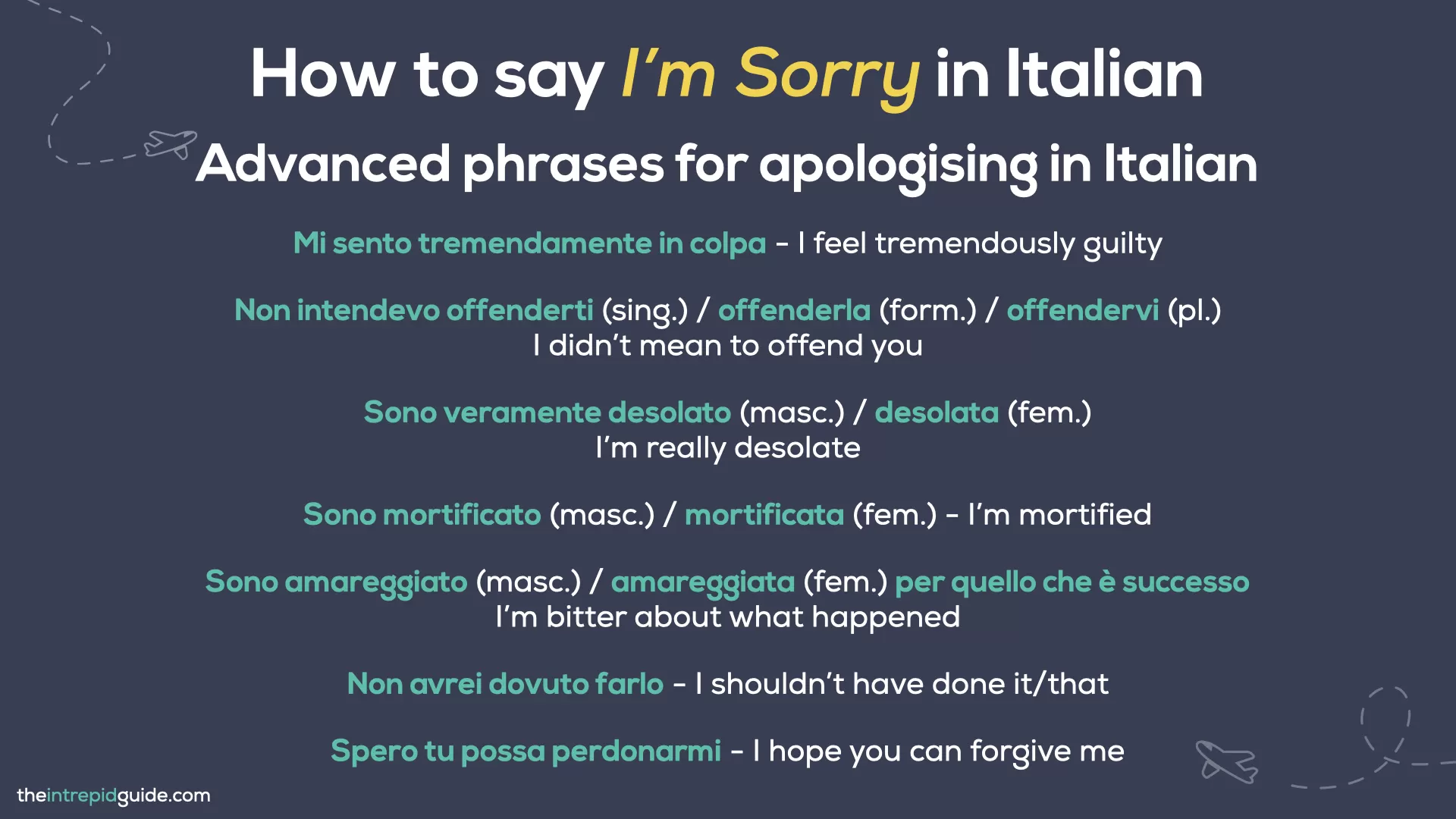 Try these fixed phrases to show deep regret for something you did (intentionally or unintentionally). Note how these forms are rather more advanced and show different shades of being sorry.
Try these fixed phrases to show deep regret for something you did (intentionally or unintentionally). Note how these forms are rather more advanced and show different shades of being sorry.
- Mi sento tremendamente in colpa (I feel tremendously guilty)
- Non intendevo offenderti (sing.) / offenderla (form.) / offendervi (pl.) (I didn’t mean to offend you)
- Sono veramente desolato (masc.) / desolata (fem.) (I’m really desolate)
- Sono mortificato (masc.) / mortificata (fem.) (I’m mortified)
- Sono amareggiato (masc.) / amareggiata (fem.) per quello che è successo (I’m bitter about what happened)
- Non avrei dovuto farlo (I shouldn’t have done it/that)
- Spero tu possa perdonarmi (I hope you can forgive me)
- Come posso rimediare? (How can I fix it?) – This is the only expression that doesn’t just ask for forgiveness but also seeks to find a way to remedy the situation.
How to reply when someone says sorry to you in Italian
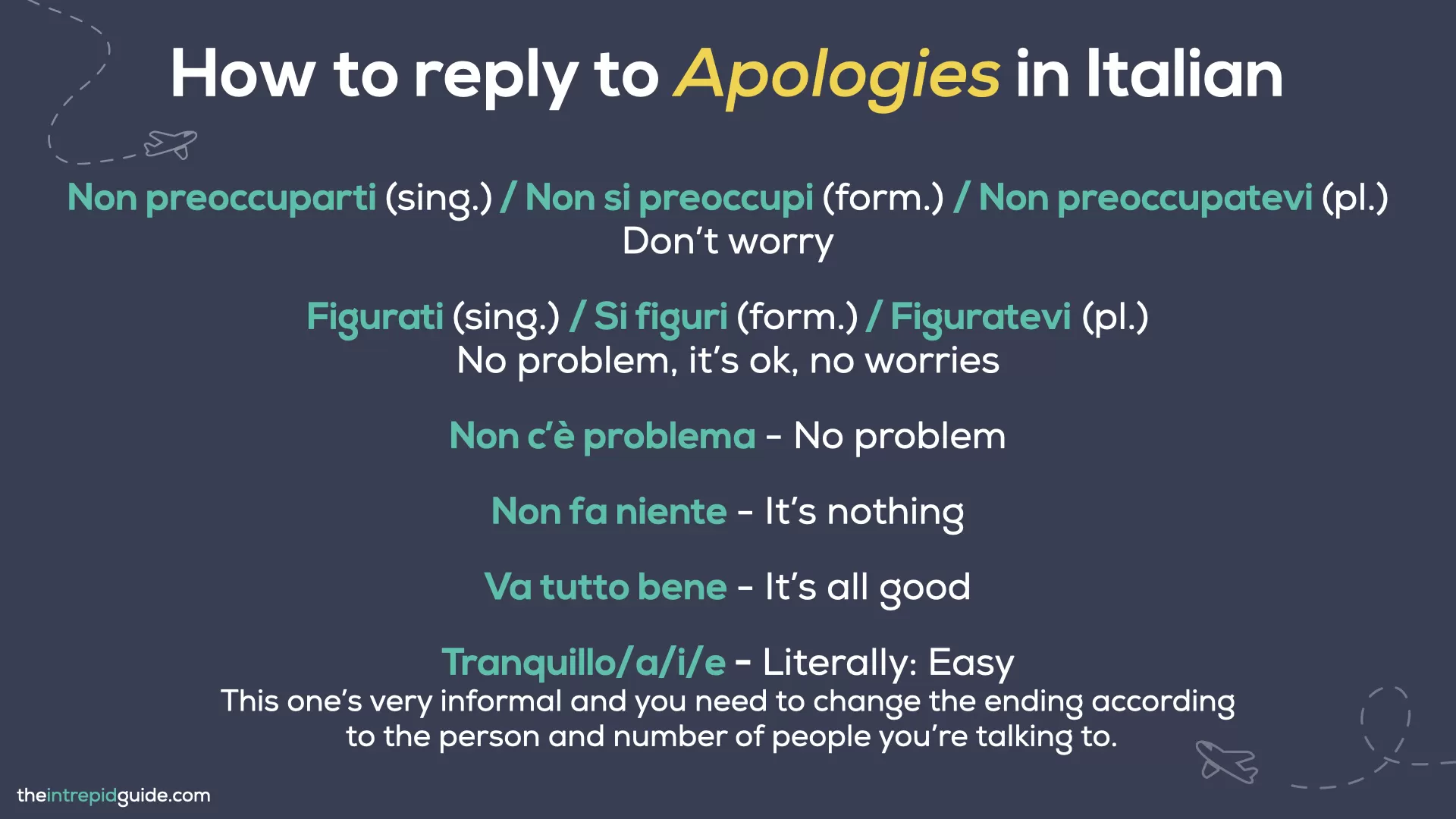 How do you respond to someone who’s apologized to you in Italian? Well, you have quite a few alternatives. Here are some example responses to try:
How do you respond to someone who’s apologized to you in Italian? Well, you have quite a few alternatives. Here are some example responses to try:
- Non preoccuparti (sing.) / Non si preoccupi (form.) / Non preoccupatevi (pl.) (Don’t worry)
- Figurati (sing.) / Si figuri (form.) / Figuratevi (pl.) (No problem, it’s ok, no worries)
- Non c’è problema (No problem)
- Non fa niente (It’s nothing)
- Va tutto bene (It’s all good)
- Tranquillo/a/i/e (Easy, man): this one’s very informal and you need to change the ending according to the person and number of people you’re talking to.
Learning these basic Italian phrases will definitely make you sound more natural as you improve your Italian. Knowing how to say sorry in Italian according to the situation and to who you’re apologizing will also ensure you don’t make a brutta figura (bad impression).
Making mistakes are part of our everyday life, but, when it comes to learning Italian, this shouldn’t stop you from trying! So, non chiedere scusa (don’t say sorry) for not having a perfect Italian accent or not using the right word when you need it, just keep trying! :-)
Watch the full video lesson on my YouTube Channel
 Enjoyed this guide? Are you a beginner or an intermediate Italian learner? Got a trip coming up or want to communicate with your Italian partner or relatives in Italian? Learn Italian with my unique 80/20 method
Enjoyed this guide? Are you a beginner or an intermediate Italian learner? Got a trip coming up or want to communicate with your Italian partner or relatives in Italian? Learn Italian with my unique 80/20 method
Registrations are now open to join Intrepid Italian, my new series of online video courses that use my unique 80/20 method. You’ll go from a shy, confused beginner to a proficient and confident intermediate speaker, with me as your trusty guide.
You’ll finally be able to connect with your Italian partner, speak to your relatives and enjoy authentic travel experiences in Italy that you’ve always dreamed of, and so much more.
As a native English speaker who learned Italian as an adult, I know what it’s like to feel hopeless and lack the confidence to speak. I know what it’s like to start from scratch and to even go back to absolute basics and learn what a verb is!
Intrepid Italian was created with YOU in mind. I use my working knowledge of the English language to help you get into the ‘Italian mindset’ so you can avoid the common pitfalls and errors English speakers make – because I made them once too! I break everything down in such a way that it ‘clicks’ and just makes sense.
No matter what your level is, there is an Intrepid Italian course for you, including:
- 🇮🇹 Intrepid Italian for Beginners (A1)
- 🇮🇹 Intrepid Italian for Advanced Beginners (A2)
- 🇮🇹 Intrepid Italian for Intermediates (B1)
You can join 1, 2, or all 3 courses, it’s entirely up to you. The best part is that you have lifetime access so you learn anytime, anywhere and on any device.
As your guide, I walk you through each lesson, step-by-step, using my unique 80/20 method. My approach is different from traditional methods because I teach you the most important 20% of the language right from the beginning so you can start to speak straight away.
Each course includes video lessons, audio exercises, downloadable worksheets, bonus guides, a private support community, and lifetime access all designed to streamline your learning while having fun.
It even comes with my famous Celebrate with a Spritz Guarantee. After 30 days of using Intrepid Italian, if you don’t want to celebrate your newfound Italian skills with an Aperol Spritz, you don’t have to pay a penny! Cheers! 🥂
Join Intrepid Italian here and start learning today!
Ci vediamo lì! (See you there!)

Learning Italian? Check out these Italian language guides
- Italian Prepositions: The Only Guide You’ll Ever Need (PLUS Italian Prepositions Chart)
- Italian for Beginners | How to Learn Italian in 3 Simple Steps
- Italian Cognates & Loanwords: 17 Rules to Italianizing English Words You Already Know
- Ultimate Guide to the Italian Alphabet: Letters, Pronunciation, and Stress
- How to say ‘Merry Christmas’ in Italian [Plus New Year Vocabulary and Quiz]
- 34 Words That Don’t Exist in Italian (English Loanwords in Italian)
- Italian Culture: 19 Weird Things Italians Do That No One Warns You About
- 17 Weird Italian Superstitions Italians ACTUALLY Live By
- 17 Must-Know Italian Hand Gestures: The Ultimate Guide
- Top 24 Most Important Verbs in Italian (Plus PDF Cheat-Sheet & Quiz)
- 10 Ways Natives REALLY Say ‘You’re Welcome’ in Italian
- How to say ‘Please’ in Italian in 9 Ways Like a Native
- 41 Italian Greetings: How to Say ‘Hello’ in Italian Like a Local
- 125 Most Common Italian Phrases for Travel You’ll Ever Need [PLUS Printable]
- 8 DEADLY mistakes in Italian (& How to Avoid Them)
- How to Conjugate Italian Verbs in 3 Simple Steps [Italian for Beginners]
- Is Italian Hard to Learn? 7 Common Mistakes & How to Avoid Them
- Master Days of the Week in Italian (7 Simple Memory Hacks)
- Italian Numbers: How to Count in Italian From 0 to 1 Billion (Plus PDF Download)
- How to Order Food & Drinks in Italian [Italian for Beginners]
- 15 Italian Words You Should NEVER Mispronounce [& How Not To]
- 11 Effective Hacks That’ll Help You Learn Italian So Much Faster
- Top 14 Italian Words You Should NEVER Say [& What to Use Instead]
- 20 Hilarious Everyday Italian Expressions You Should Use
- Romanesco: 25 Cool Roman Dialect Words You Should Use in Rome
- 10 Reasons Why Learning Italian Will Change Your Life
- 10 Italian Expressions Italians Love Saying
- 10 Italian Phrases That Will Instantly Make You Sound more Italian
- Funny Italian Sayings: 26 Food-Related Insults You Won’t Forget
- 15 Romantic Italian Films That’ll Make You Love Italy Even More
- How to Master Common Italian Phrases for Travel (Like a Local!)
Like it? Pin it for later!

Over to you!
Did you find this guide helpful? Got a question? Let me know using the comments section below or join me on social media @intrepidguide or @intrepiditalian to start a conversation.
Thanks for reading and I hope you enjoyed this post.
Like what you see? Subscribe using the form below to have all of my posts delivered directly to your email.

